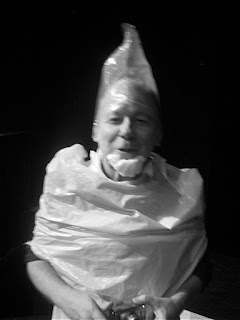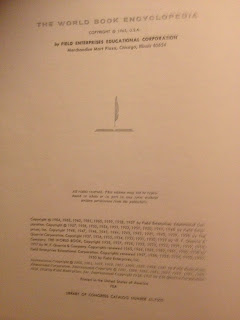A great amount of reading has taken place over the years during downtime --
including the complete New Grove's Dictionary of Music and Musicians (1980, 20 volumes),
much of the Britanica Great Books of the Western World (1952, 54 volumes,
presently on Volume 22: Geoffery Chaucer (1343-1400) - Canterbury Tales (1400), and
attempting to read all the literature in the home library, reorganizing it as we go along from alphabetical (early entries such as Edward Abbey [1927-1989]
Desert Solitaire [1968]) to chronological
(Aesop [620-564 BC]
Fables [564 BC --
bringing to mind my portrayal of same in John Bilotta's Quantum Mechanic, presented by Goat Hall Productions in 2006].
So it looks like another project is going through the old World Book Encyclopedia (1964), purchased by Bette and George when I was 7 years old, and brough to California many years ago from Pennsylvania.
This was the reference of my youth,
and enlightening to return to it to see how influential it was, and how much of the world has changed since then. Of course, American History loomed verty large, and
John [Coolidge] Adams (b. 1947) and
John Luther Adams (b. 1953) were rather young.
Advertising was given more space than
Afghanistan (inverted in Wikipedia today), but the color relief maps were always great!
Continents received grand spreads,
though
over-general, and
foreign influence was often unquestioned.
American miliary and
technology were lauded (what would it be like to sit in one of those rows?),and
U.S.
States
received impressive coverage,
while certain countries, not so much
(ah! Those gentleman in W.A. Mozart [1956-1791] Cosi fan tutti [1789] disguised as Albanians come cross the sea)....
But let's not forget that
Canada is part of the market share,
as opposed to Old-World History, so that both Alexander and
Alfred the Great are trumped
by
Alfafa.
Certainly the World Book (while engaging regularly in cultural stereotypes) is to be thanked for noting that an erg is a sand dune desert,
though that's never come in handy for answering crossword cues where the word ALWAYS referes to a unit of energy (and don't get me started as to how many notable Ali's there are who were not prizefighters).
And if Alphabet (pre-Google, of course),
Alp,
and
Amazon River all receive less prominence than Aluminum, well, that's just better living through chemistry (the geography articles always left me eager for more).
American
Literature (loved those time lines!)
receives a decent,
reasonably
up-to-date-for-the-times
spread -- but American Music nothing but "see BLUES" and a few more popular-music links. Clearly I received my musical inspirations elsewhere...
Ammunition more than
Amsterdam or Roald Amundsen,
no mention of the Sumerians or South / East Asia in Ancient Civilizations.
Definitely there's still
much of interest,
even if Andromeda is -- inexplicably -- only mentioned as a myth (understandable!) and
Constellation... but not a Galaxy, article-wise!
Ah, angels those Abrahamic shadows of polytheism, and if only we could peer behind the black-and-white clouds of Venezuela's
Angel Falls!
Not overly-long articles Angkor Wat, Anglo-Saxons, and Angola -- despite importance, influence, population, etc -- the latter still a colony at that point, and no particular objections . Throughout the work, conquest is fine if the locals are "underutilizing" the land (if your side wins, the invader is a conqueror, rather than a war criminal)...
Big article on Animals,
strangely organized until its end, then suddenly enlightening...
Sometimes days are like this, the present one the 18th of spring, high down 1 to 60 --
Megan over for a visit with Harriet and company, the musical work including editing page 30 new-edition Mice and Men, Op. 45: Act IV, beginning
The Decameron, Op. 289
100 Novels for Voices and Instruments, after the work (1353) of Giovanni Boccaccio (1313-1375)
Tenth Day / Novel VIII
Sophronia, albeit she deems herself wife to Gisippus, is wife to Titus Quintius Fulvus,
and creating system 3
Broke Dance Suite, Op. 290
IVb3. Basse Dance (Jouyssance Vous Donneray)
The playlist for the day continues in an Igor Stravinsky[1882-1971] mode with
Les Noces (1923)
Octet (1923)
Tilimbom (1923)
Concerto for Piano and Winds (1924)
Piano Sonata (1925)
Piano Serenade in A (1925)
Apollo (1926)
So many interesting aspects of each of these pieces, of course -- but one particular connection revisits the experiences of Piano Sonata dedicatee / painter / pianist-organist / salon empressaria Winnaretta Singer (Princesse Edmond de Polignac, 1865-1943)... 20th of 24 children re
sewing-machine magnate, multiple-wived / bigamist / philaderer Isaac Singer (1811-1875)... It is Winaretta we have to thank for support of various composers and their works, including...
Emmanuel Chabrier (1841-1894)
First performances
Gabriel Faure (1845-1924)
First performances
Ethel Smith (1858-1944)
Love affair
Patronage
Claude Debussy (1862-1918)
First peformances
Erik Satie (1866-1925)
Socrate (1919) - Commission
Maurice Ravel (1875-1937)
First peformances
Pavane for a Dead Princess (1899) - Dedication
Armande de Polignac (1876-1962, Singer's neice)
Patronage
Manuel de Falla (1876-1946)
El Retablo de Maese Pedro (Master Peter's Puppet Show, 1923) - First performance
Igor Stravinsky (1882-1971)
Renard (1916) - Commission
Piano Sonata (1925) - Dedication
Nadia Boulanger (1887-1979)
Patronage
Darius Milhaud (1892-1974)
Les Malheurs d'Orphee (1924) - Commission / First performance
Germaine Tailleferre (1892-1963)
Piano Concerto No. 1 (1923) - Commission
Francis Poulenc (1899-1963)
Double Piano Concerto (1932) - Commission
Organ Concerto (1938) - Commission
Kurt Weill (1900-1950)
Symphony No. 2 (1934) - Commission
Jean Francaix (1912-1997)
Le Diable Boiteux (The Devil upon Two Sticks, 1937) - Commission
Serenade pour Douze Instruments (1934) - Commission
She also had an amazing love life -- featuring two unconsumated marriages (the latter at least lavender, re composer Edmond de Polignac) and multiple unconcealed Lesbian relationship, including some married women...
































































